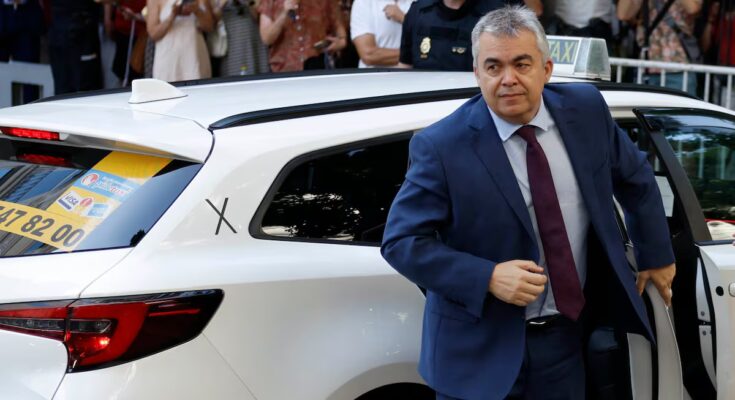On April 9, 2019, the then Minister of Transport, José Luis Ábalos, had a conversation with his advisor, Koldo García, which was secretly recorded by him. In this audio, integrated into the Supreme Court report in which both he and former PSOE leader Santos Cerdán are under investigation, García complained about the latter’s attitude, which, he assured, was putting pressure on the ministry to ban a million-dollar project as soon as possible. “(…) The problem is that Santos, and we need to talk to him, is obsessed with him, with him, with Seville, with the bridge. But the obsession is something else. As he makes me understand, I understand that he is risking his life (…) with all the pressure he exerts, it seems to me that either the position is at stake or the moon is at stake”, said the former councilor and currently one of the main suspects for the alleged corruption plot that broke out. between 2018 and 2021 in that ministry.
The tender for which Cerdán allegedly “put pressure” on Koldo García and Ábalos was the competition for the awarding of the renovation works of the V Centenario Bridge in the Andalusian capital, a contract whose cost, when it was signed in May 2021, was 71 million euros but which two years later rose to over 102 million. The Central Operational Unit (UCO) of the Civil Guard has once again focused on this contract and last Friday, after having delivered a still secret report on Cerdán’s financial situation to Supreme Court magistrate Leopoldo Puente, it surveyed, among others, the headquarters of the three companies that formed the Temporary Union of Companies (UTE) that won that competition, Acciona, Freyssinet and Tecade. He also entered the home of a former senior official of the former, Justo VP, who was the company’s construction director for Spain.
Suspicions about this award are not new. Last June, another Civil Guard report – this one referring to Ábalos’ financial situation – already contained alleged irregularities in this context. Subsequently, the UCO included in the document sent to Supreme Court magistrate Leopoldo Puente a detailed chronology of the WhatsApp messages exchanged by Cerdán and Koldo regarding the tender, as well as the conversations recorded by the latter and the alleged intervention of Javier Herrero, then general director of Autostrade (the body responsible for the tender) and currently indicted at the National Court for his alleged involvement in various frauds of the conspiracy.
According to the June report, Ábalos and his former advisor were supposed to receive 450,000 euros in bribes for the alleged irregular awarding of that work and two others, which Koldo unsuccessfully claimed from Cerdán, again according to the contents of the recordings attached to the case. When he testified before the Supreme Court, Cerdán denied any irregular action on his part and justified his interest in accelerating the work of the bridge in the Andalusian capital with the desire to favor the campaign of the socialist candidate in the municipal elections that would take place in May of that year, Juan Espadas, so that he could repeat himself as mayor of Seville.
Provisional release
These messages and the rest of the documentation on this work have now been included in the Guardia Civil report which led to the latest documents and which focuses on the estate of the former socialist leader. He has been in provisional prison since June 30, accused of allegedly committing the crimes of corruption, criminal organization and influence peddling when Judge Puente found that, if he were released after making his statement that day, there was “a certain risk” that he would destroy or alter relevant evidence, one of the legal requirements for ordering his imprisonment.
The imprisonment in his case can only be extended until December 30th, when six months have passed since the measure was taken, but everything suggests that before that date the magistrate will order his release, since the procedures carried out now eliminate any possibility of destroying the evidence. In fact, in the documents in which he rejected the request of the politician’s defenders to release him from prison, the magistrate already announced that he was waiting for the delivery of the police document and anticipated that with it on his table “it will not be necessary” to exhaust this deadline.
The judge and the Anti-Corruption Prosecutor’s Office have so far maintained, in their writings in which they refused his provisional release, that Cerdán had a role of “a certain pre-eminence” within the conspiracy. Cerdán, according to the evidence collected by the investigators, “was in charge of carrying out the appropriate procedures with the payers”, who “would be in the best position to know” who charged the most and “to hide, alter or make disappear the evidence that may exist in this regard, as well as the way in which the illicit payments were articulated”.
The magistrate identifies the former leader of the PSOE as the person “in charge of making undue accusations against the companies favored by the award”. Once these sums were obtained from the companies, they were distributed, sending them “at least” to Ábalos and Koldo García, “who, when they needed them, claimed payments from him and not from these (companies)”.
“This functional position determines that these last two, Messrs. Ábalos and García, could not have known, perhaps, who were the concrete natural persons who, for the benefit of the company favored by the award – Acciona Construction acting in UTE – made the payments, what was the total amount of the same and what was the mechanism by virtue of which they were made”, said the investigator on the day he imprisoned the former socialist leader, an argument that his lawyers have so far rejected in their writings, without success.



